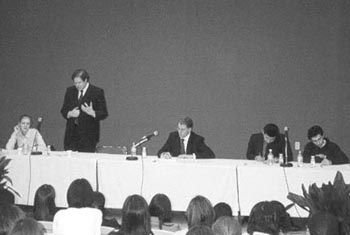
"Debate is a necessary skill for every field of society. In order to become influential women leaders, active English debate is indispensable, says Professor Chung Duk-ae, Dean of the College of Liberal Arts, who was in charge of organizing this debate.
The four students from Ewha who are Lee Hyun-joo (Law, 4), Lee Kong-jin (Division of International Studies, 2), Yang Yoo-kyung (English Literature, 3), and Kim Bee-ah (DIS, 1) debated on October 4 all feel their public debate was an important part of their preparation for future careers in the international arena. They were selected on the basis of an impromptu discussion under the guidance of Professor Chung. They were then given the topic, "Should the U.S. forces stay in Korea?" and prepared for their debate in the British Parliamentary Style for five days.
"In this Parliamentary format where a mediator puts out a proposition and one team supports it while the other opposes it. There are two rounds for each team, one to make arguments and the other to rebut the opposing arguments.This system was quite new to us. The Korean education system does not incorportate debating as part of the academic curricuculum," says Lee Hyun-joo.
Lee"s comment highlights an essential difference in Korean and Western education. Most students from the West build debate skills through discussion-based classes from an early age. Debate clubs in high school and college offer access to more persuasive techniques through competitions and coachings. Such debate clubs participate in nationwide and international tournaments to compete against debaters from different parts of the world.
In contrast, while the Graduate School of Translation and Interpretation (GSTI) requires the interpretation students to take a mandatory course in debate, undergraduates are not trained to such international standards.
"Korea needs to construct a plan for developing debate skills to raise future leaders who can speak up effectively on behalf of Korea on the international stage. Government officials are also looking into this issue and encouraging universities to incorporate debate into their academic agendas. Ewha plans to prepare students for future debate tournaments," says Professor Chung.
syc1223@ewha.ac.kr

